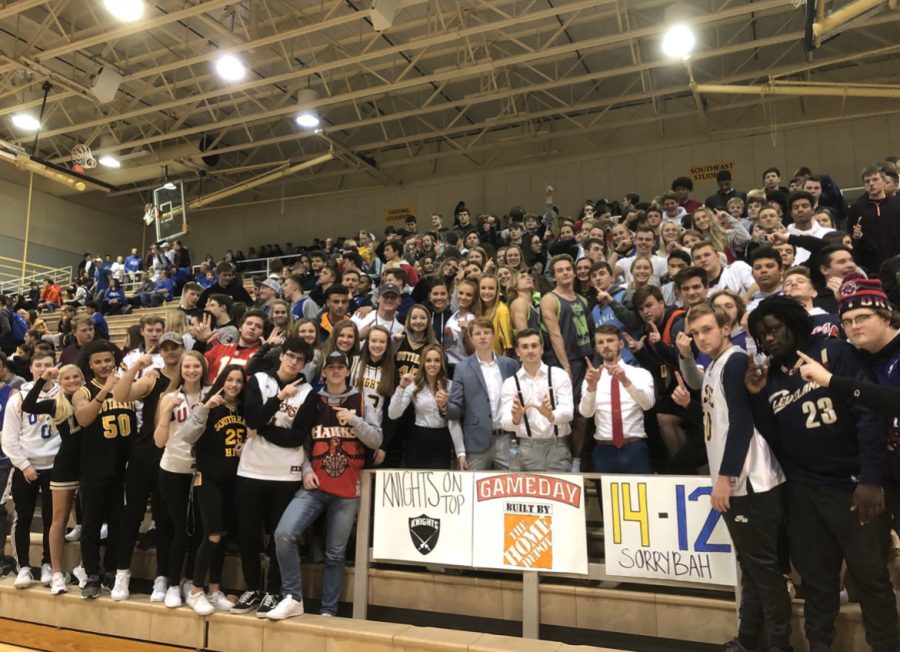Front-row seat dispute at basketball game sparks protest, dividing LSE student section
photo from the LSE_DFA on twitter
Note: This is a photo of the LSE student section from a previous year, not from the night discussed in the story
February 3, 2022
At the Jan. 20 Fremont vs. Southeast High School (LSE) basketball games, the LSE student section became divided when fans who had been sitting in the front row for the earlier girls’ varsity game were told to give up their front row seats to incoming fans for the boys’ game. This predominantly female section refused, and the newly arrived fans– the majority being male– proceeded to create their own student section apart from the others.
Varsity Girls’ Basketball player and LSE senior Cortney Covington says that right before leaving to have her team’s post-game talk, the student section was united.
“Then we came back, and there was a 15 row gap between the three rows of girls and the rest of the students at the top,” she said.
Covington says that prior to the situation, their coach had brought up some concerns to them about an all male group chat that expressed strong feelings of not wanting any females in the front rows, out of a belief that “girls don’t cheer,” additionally referring to females in derogatory and explicit language.
Covington believes that it is unfair for people to create a stereotype that “women don’t cheer”.
“When I go to any game, I’m super loud and super hype, and I know [many other girls] are the same way,” she said.
Sponsor of LSE’s Feminist Club and Women’s Literature teacher Madison Hilbert was informed about the situation through the feedback of her students and club members, due to the fact that club day occurred five days out from this student section dilemma.
“They had just shared their frustration with me about what had happened, and were questioning what our next steps would be,” Hilbert said.
Hilbert thinks that instead of generalizing women as people who don’t get excited during games, they could just generalize it as anyone who isn’t doing their part in creating an electrifying environment.
“If the purpose of the student section is to have a lot of energy and a lot of enthusiasm, that’s fine. That should be the expectation that’s communicated to students,” Hilbert said. “Not that because someone is a girl, they can’t be in the front. Girls are perfectly capable of being loud.”
Covington shares a similar opinion to that of Hilbert’s.
“If they’re going to say that girls don’t cheer, then they should be doing the same thing to boys that don’t cheer,” Covington said.
She says that this has been an ongoing issue in all male sports student sections.
“It’s happened at football games too,” Covington said. And she says even though she’s a senior, she was still asked to move from the front row.
Covington feels that while this was an injustice to the female fans of the sport, the situation plays into a much bigger issue relating to the lack of attendance with female sports, especially girls’ basketball.
”We never really have a student section,” she said.
Covington says that the fans for their basketball game that day consisted of only two males, and the remainder of the two rows were females. Yet by the end of the girls game, the gym began flooding with fans who had just arrived for the 7:30 p.m. boys basketball game.
Covington believes that the students who got front row seats and were present at the earlier game(s) have every right to remain in the front row for the rest of the night. To her, the supporters who came for the later games, do not have authority nor the right to tell those who were there for earlier games to move.
Hilbert thinks that no matter the reasoning for committing the act, it’s problematic if it is causing harm to others.
“When we have conversations asking, ‘what was the intent? ’, ‘what was the purpose?’, ultimately, that’s not the most important question to be asking,” she said. “The most important question is: how are people impacted by this event?”
She says that these kinds of acts may lead students to feeling unwelcome at events such as these.
“There’s nothing wrong with letting different students sit in the front few rows”, she said.
Principal Tanner Penrod says that he is unhappy with the actions of these students, as well.
“Seating at sporting events is general admission, meaning spectators can choose to sit where they want,” he said. “The LSE student body has had a long-standing tradition of sitting as a group in support of our student-athletes during competition. The division of the LSE student section on the evening of January 20 was very disappointing, especially when learning of the rationale that led some to make this decision.”
Ultimately, Covington views the whole situation as a much bigger problem that society continues to struggle with.
“I think it’s just pure sexism,” she said. “And I feel like nobody was really held accountable.”
Hilbert says that many of her students have been experiencing a similar feeling of disappointment.
“I think students in Feminist Club feel that their interactions in their accounts as students– particularly female students– are not being listened to,” she said.
Due to these shared emotions towards the situation, Penrod made a statement on behalf of LSE administration on the actions that have been taken since the event.
“LSE administration followed up with a number of students during the game and the school days after to help those involved understand the impact of their decision, and the hurtful rhetoric amongst students that led to it,” Penrod said. “LSE administration encourages all students to support all of their teams– regardless of gender, participation level and sport.”









